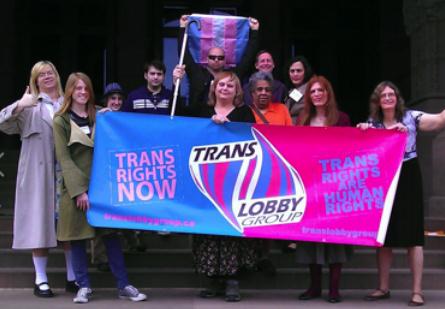
The Trans Rights Lobby Group celebrates outside Queen's Park on May 10. Credit: Davina Hader
Ontario NDP MPP Cheri DiNovo stood beaming in the Ontario Legislature on May 10.
“Today we have seen the ‘progressive’ in Progressive Conservatives. We have seen the true ‘liberal’ values in the Liberal Party,” she said.
DiNovo’s legislation, Bill 33, finally made it through second reading in the provincial legislature.
The bill — also known as Toby’s Act — has seen the floor of the legislature three times before. It’s named for well-respected trans rights activist Toby Dancer, who died in 2004. This time, for the first time, it appears that it may pass.
That, says trans rights activist Susan Gapka, is “historic.”
The previous incarnations of the bill — introduced by DiNovo in 2007, 2009, 2010 — received first reading in the legislature and then quietly died on the floor. They received no debate, never made it to committee and were never brought to a vote.
The 2010 version of the bill met a particularly unhappy end at the hands of Ontario’s attorney general, Liberal Chris Bentley, who said that the protections the bill afforded were already covered under federal law.
This time around, it’s the Liberals and PCs who breathed life into the bill.
“It was three parties . . . all speaking in favour of extending human rights,” says Gapka, chair of the Trans Lobby Group, who was cited several times by members of all parties for her work on trans rights. She says the love coming from the legislature was “rare.”
The bill was co-sponsored by Liberal Yasir Naqvi and Progressive Conservative Christine Elliott. Both took to the floor, along with a couple of their fellow partisans, to support DiNovo’s bill.
That is, DiNovo says, “phenomenal.”
The Liberal support for the bill amounted to a sort of mea culpa. In an interview with Xtra, Naqvi said that while he believed the provisions in this bill were already covered by law, just as the auditor general said in 2010, he admits, “we need clarity.”
This sort of bipartisan consensus, especially on a trans rights matter, stands in stark contrast to some of the debate surrounding the issue of gay-straight alliances in Ontario.
“This will make a huge, huge difference,” DiNovo says. The only dark cloud over the day, she says, is that no media — Xtra aside — are covering it.
One of the most impassioned speeches came from openly gay Liberal MPP Glen Murray. As his voice broke and his eyes welled up with tears, Murray thanked the trans rights activists gathered in the gallery above, calling them “an inspiration to all those who think it’s impossible.” He called on all supporters of the bill to make sure everyone knows how important the bill is. “We can’t hide our support,” he said.
The Progressive Conservatives, for their part, stood in full-throated support for the bill. Elliot, deputy leader of the PCs, says all three co-signers were happy that such “a fundamental issue related to human rights has gone forward.”
“It was a good day for all of us as parliamentarians,” says Elliot.
Toby’s Act now continues on to the social policy committee, where it will be studied and then returned to the legislature for a final vote. DiNovo says it’s a “race against the clock,” as the session ends on June 7. But if the bill doesn’t make it back for a final vote before the end, she says, it’s not the end of the world; “worst-case scenario; it’s not this Pride, it’s next Pride.”
But with the luck the trans community is having on the provincial and federal levels, it seems destined to pass soon. Last month, the Ontario Human Rights Tribunal struck down barriers for trans people to change their birth certificates — with Quebec now looking to do the same — Jenna Talackova will be competing for Miss Universe, and Transportation Canada representatives said they are considering changes to the gender category on passports.
With Bill-33 on its way to committee, the eyes of the three parliamentarians are now moving to the GSA issue standing before the legislature, where they hope the goodwill fostered by this bill will spill over and ensure the last few matters of contention will be resolved.
Gapka is looking to provincial funding for sex reassignment surgery (SRS) as one of the next important matters. She notes that governments tend to go after SRS funding when they need to balance the books. She wants to make the surgery and related therapies even more accessible.
Meanwhile, in Ottawa, the bill’s federal sister is waiting somewhere near the bottom of the order paper, after debate on its second reading was cut off by the Easter break. The bill, having been introduced many times already, is currently under the wing of NDP LGBT critic Randall Garrison. Given the federal Conservatives opposition to it, its passages in the near future is unlikely.
This is in stark contrast to Toby’s Act, where the only question now appears to be whether it will pass with a majority or unanimity. While none of the bill’s co-sponsors were willing to place any bets, they were all confident the bill will enjoy easy passage.


 Why you can trust Xtra
Why you can trust Xtra


